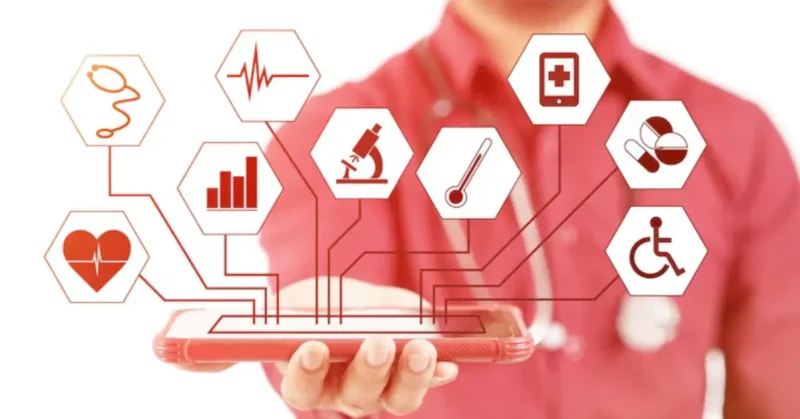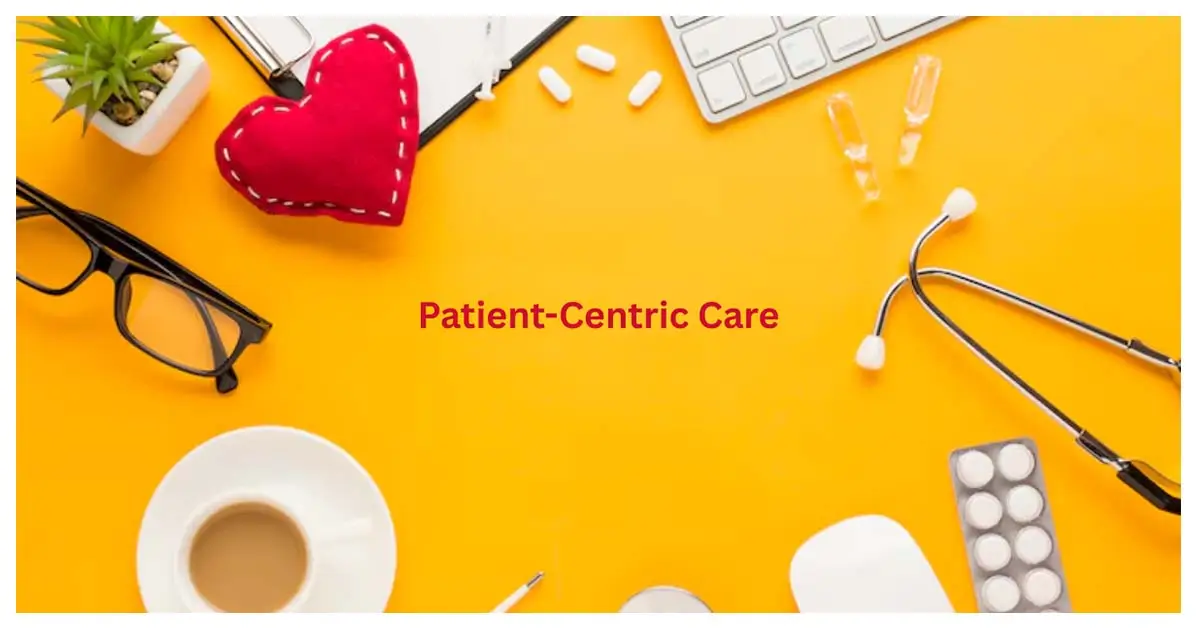Patient-centric care in the digital age provides real-time health data, personalized treatment, and enhanced communication, ultimately improving outcomes and transforming digital health.
Thank you for reading this post, don't forget to subscribe!How Digital Health Technology Transforms Patient-Centric Care
Patient-centric care in the digital age is fundamentally transforming the landscape of healthcare delivery, making it more personalized, accessible, and efficient than ever before.
The advent of digital tools, including telemedicine platforms, wearable health devices, and comprehensive electronic health records, has revolutionized the way patients engage with their health and healthcare providers.
Telemedicine enables patients to consult with healthcare professionals remotely, breaking down geographic barriers and allowing individuals in rural or underserved areas to access specialist care without the need for extensive travel.
This convenience not only enhances access to medical advice but also reduces waiting times and alleviates the strain on healthcare facilities.
Wearable devices, such as fitness trackers and smartwatches, enable patients to monitor their vital health metrics in real time. These devices facilitate ongoing self-assessment, enabling users to track their physical activity, heart rate, sleep patterns, and more.
This continuous flow of health data encourages proactive health management and fosters a stronger relationship between patients and their providers.

Electronic health records (EHRs) centralize patient information, enabling the seamless sharing of medical histories, treatment plans, and test results among healthcare teams. This integration enhances care coordination, reduces the risk of errors, and ensures that healthcare providers have access to the most up-to-date information necessary to make informed clinical decisions.
Together, these digital advancements motivate patients to take an active role in managing their health by enhancing their ability to make informed choices, easily communicate with providers, and receive care tailored to their individual needs and preferences.
In a world driven by connectivity and technological innovation, digital tools are not merely complementing healthcare; they are fundamentally redefining the patient experience, ensuring that care is more responsive, personalized, and aligned with patients’ lifestyles for patient-centric care.
A New Era of Digital Patient-Centricity
We are experiencing a significant shift in healthcare where patients are no longer passive recipients but empowered participants in their health journeys. This digital transformation accelerates the change by integrating advanced technologies to create a seamless, personalized, and proactive care experience.
With real-time data, remote monitoring, and intelligent platforms, digital health is redefining the concept of patient-centric care.

Patient-Centric Care: Digital Tools that Empower
Seamless Access to Personal Health Information
Secure digital platforms, such as Electronic Health Records (EHRs) and patient portals, grant individuals direct access to their complete medical histories. Lab results, imaging, prescriptions, and doctor notes are just a login away.
Patients no longer wait days or weeks for basic updates—they review, download, and share their data instantly.
Key Benefits:
- Faster access to test results
- Reduced administrative delays
- Better coordination between multiple providers
Continuous Monitoring with Wearables and Smart Devices
Wearable technology, from smartwatches to glucose monitors, enables real-time health tracking. These tools collect biometric data such as heart rate, blood pressure, oxygen levels, and sleep patterns, transforming passive health monitoring into active self-care.
Applications Include:
- Managing chronic illnesses like diabetes and hypertension
- Tracking physical activity and calorie expenditure
- Notifying providers and users of abnormalities in vitals
Encouraging Self-Management with Tailored Insights
Health apps provide personalized education, behavior modification tools, and AI-generated wellness plans. Patients engage with content specific to their condition, helping them stay on track with medication, diet, and lifestyle changes.
Examples of Self-Management Tools:
- Medication reminder apps
- Cognitive behavioral therapy (CBT) platforms
- Diet trackers with personalized nutritional guidance
Digital Health Empowers Informed Decision-Making
Patients Ask Smarter Questions
Digital health literacy platforms provide evidence-based insights on diagnoses, therapies, side effects, and prognosis. Armed with knowledge, patients arrive at appointments prepared with targeted questions, resulting in productive, collaborative discussions.
Popular Sources:
- Mayo Clinic’s symptom checkers
- Healthwise patient education tools
- NIH and CDC resources
Informed Choices Lead to Better Outcomes
Patients are now equipped to compare procedures, understand recovery timelines, assess risks, and choose options that align with their values and lifestyle. Decision aids integrated into patient portals and telehealth platforms help simplify complex medical decisions.
Supported decisions include:
- Choosing between surgery and conservative therapy
- Evaluating experimental treatments
- Planning palliative vs. curative approaches
Advocacy and Autonomy in Healthcare Interactions
Digital health platforms help patients create objectives, record concerns, and monitor their progress. They become active stakeholders in shaping care plans and demanding accountability.
Impactful Tools:
- Goal-setting modules in patient portals
- Symptom diaries linked to EHRs
- Voice-activated healthcare assistants
Digital Health Strengthens Communication and Collaboration

Real-Time, Secure Messaging
HIPAA-compliant messaging systems enable patients and clinicians to exchange information quickly and securely, whether to clarify prescription dosages or share updates on recovery. This instant access prevents miscommunication and supports ongoing engagement.
Popular Platforms:
- MyChart messaging
- Teladoc Health Chat
- Microsoft Cloud for Healthcare
Virtual Consultations Remove Access Barriers
Telemedicine reduces travel time, costs, and waiting periods. It extends care to rural or underserved populations and supports ongoing management of chronic conditions. Virtual consultations are becoming the default for follow-ups and routine assessments.
Common Use Cases:
- Behavioral health therapy
- Post-operative follow-ups
- Minor acute care (e.g., UTIs, rashes)
Shared Decision-Making and Collaborative Planning
Decision-making no longer rests solely with clinicians. With collaborative digital tools, both parties contribute insights. Clinical guidelines are combined with patient values to co-create care plans that resonate with individual needs.
Collaborative Tools:
- Visual treatment roadmaps
- Co-signable digital care plans
- Symptom trackers with comment sections for clinicians
Personalized Healthcare Through Data-Driven Insights
Tailoring Treatment with Predictive Analytics
Machine learning algorithms analyze patient data to predict disease progression, detect early warning signs, and suggest personalized interventions. These systems identify patients at risk before symptoms appear.
Data-Driven Models Power:
- Early cancer detection algorithms
- Predictive risk scores for hospitalization
- Tailored medication adjustments
Lifestyle Integration Enhances Long-Term Success
Digital health ecosystems integrate personal preferences, routines, and environmental factors into care delivery. Smart nutrition plans, medication schedules synced to daily calendars, and mental health support platforms contribute to a 360-degree view of wellness.
Lifestyle-centered features include:
- Integration with Apple Health and Google Fit
- AI coaching for stress management
- Sleep optimization tools
Unified Patient Data Improves Coordination
Interoperable systems ensure that data from hospitals, pharmacies, labs, and wearables flows into a centralized record. They also ensure that all stakeholders operate from a single source of truth, minimizing errors and duplications.
Conclusion on Patient-Centric Care
The digital transformation of healthcare does not replace the human touch—it amplifies it. We create a more responsive, efficient, and compassionate healthcare system by placing power, knowledge, and tools directly into patients’ hands. The future of medicine lies in this partnership between technology and humanity, where care is not only accessible but also deeply personalized.
FAQs on Patient-Centric Care
Q. How does digital health technology affect patient care?
Digital health technology significantly enhances patient care by improving access, accuracy, and continuity. Patients can monitor vital signs, access medical records, and communicate with providers remotely.
This results in better chronic illness management, more individualized treatments, and quicker diagnoses. Technology also minimizes medical errors through electronic health records and decision-support tools.
Patients receive timely reminders and education via apps, encouraging engagement and self-care. Overall, it creates a more responsive and efficient healthcare experience.
Q. Which three instances of the application of digital technology in clinical practice come to mind?
- Electronic Health Records (EHRs): These systems store patient data digitally, enabling easy access and sharing among care teams.
- Telemedicine Platforms: Used for remote consultations, they break geographical barriers and enhance accessibility.
- Wearable Health Devices: These monitor real-time metrics like heart rate or glucose levels, supporting early interventions.
Each of these technologies helps optimize workflows, support evidence-based decisions, and improve patient outcomes. They are now integral to modern clinical environments and growing rapidly in adoption.
Q. In the context of health and social care, what is digital communication?
Digital communication in health and social care involves the exchange of information using technology such as emails, secure messaging, telehealth video calls, and online patient portals. These tools enable faster, clearer communication between patients, doctors, and multidisciplinary teams.
It ensures continuity of care, especially for patients with chronic conditions. Digital methods also support informed decision-making and collaborative planning. With encryption and data privacy measures, patient confidentiality is maintained. This digital shift enhances efficiency and reduces administrative burden across systems.
Q. How do you digitalize a patient?
Digitalizing a patient means creating a comprehensive, digital representation of their medical history, health data, and care preferences. It begins with entering their data into an Electronic Health Record system, including test results, prescriptions, diagnoses, and imaging.
Wearables and mobile apps may also contribute real-time personal health metrics. Data integration across providers allows seamless care coordination. Consent is required for secure data sharing. The goal is to ensure accurate, accessible, and up-to-date information that supports personalized, timely healthcare delivery.
Read more articles on Health and Wellness Tips.
You may like to read:

